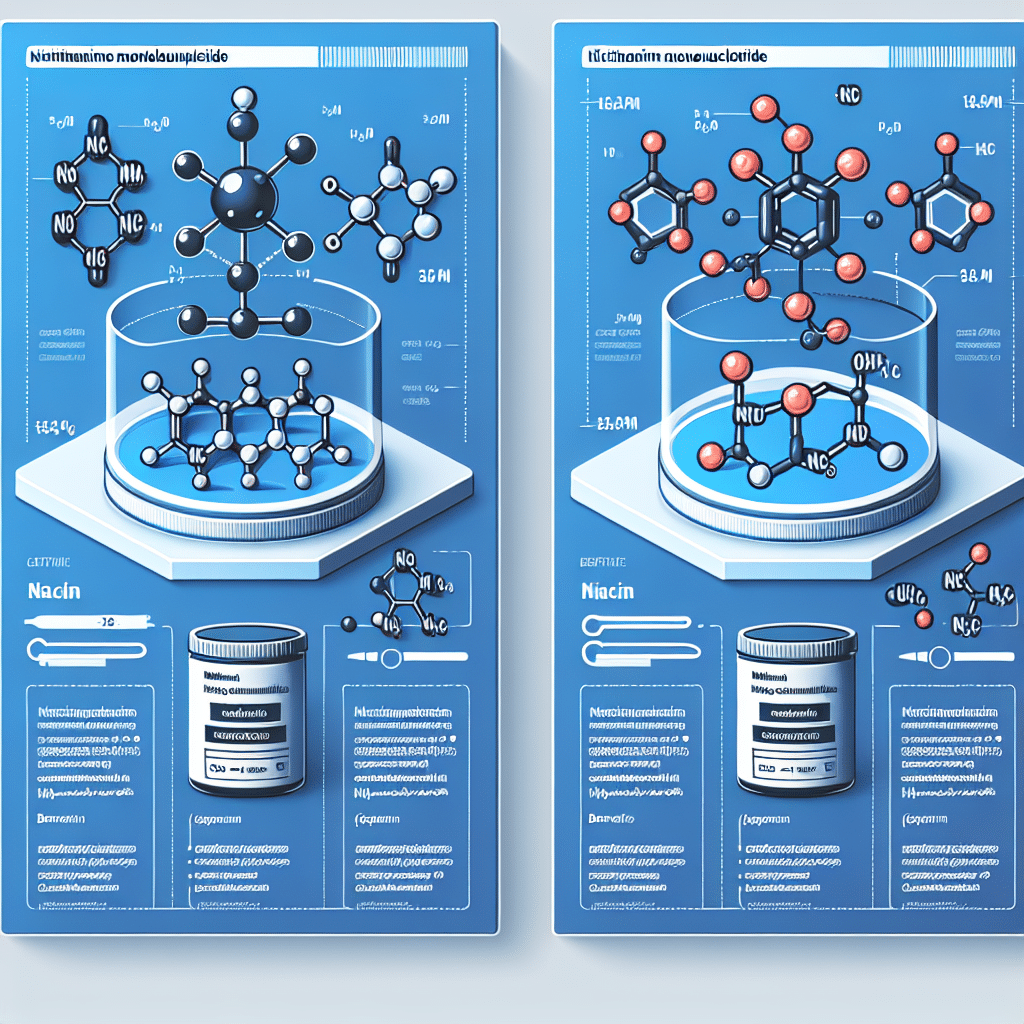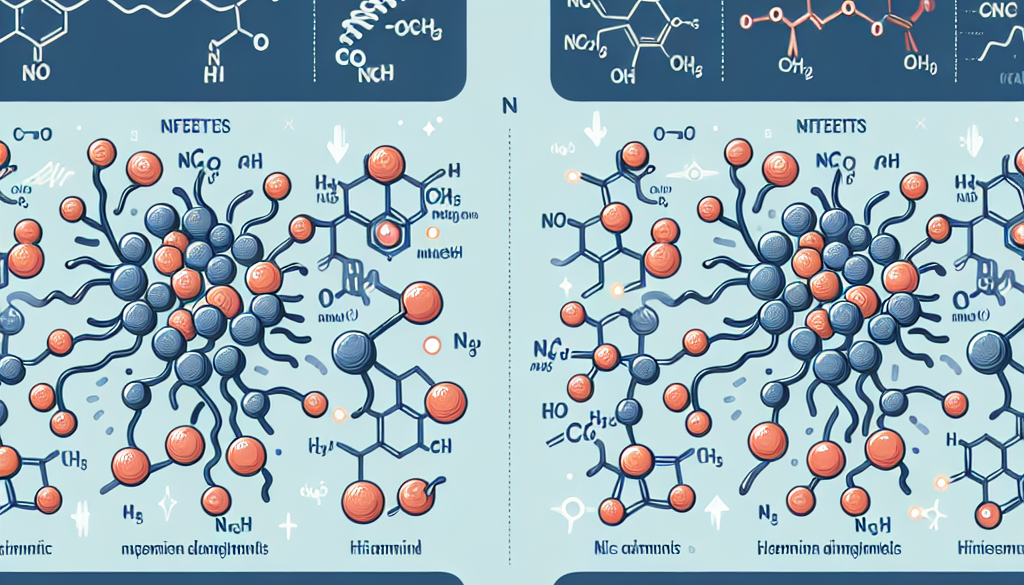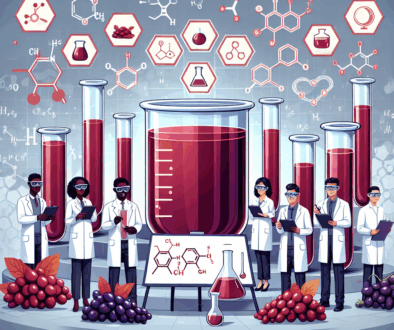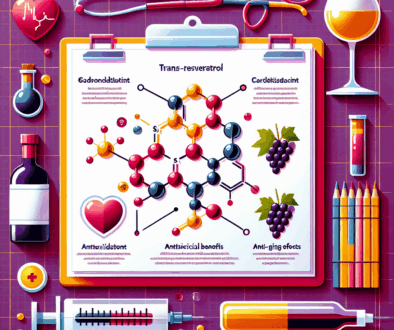Nicotinamide Mononucleotide vs Niacin: Differences
-
Table of Contents
- Nicotinamide Mononucleotide vs Niacin: Understanding the Differences
- Introduction to Nicotinamide Mononucleotide (NMN)
- Understanding Niacin
- Key Differences Between NMN and Niacin
- Benefits of NMN
- Benefits of Niacin
- Comparative Studies and Case Examples
- Statistical Insights
- Conclusion: Key Takeaways
- Discover ETprotein’s High-Quality Protein Products
Nicotinamide Mononucleotide vs Niacin: Understanding the Differences

When it comes to maintaining good health, the role of vitamins and their derivatives is indispensable. Among the plethora of nutrients that contribute to our well-being, two compounds—Nicotinamide Mononucleotide (NMN) and Niacin—stand out for their significant roles in cellular metabolism and energy production. While both are related to vitamin B3, they are not the same and serve different functions in the body. This article delves into the differences between NMN and Niacin, exploring their benefits, mechanisms of action, and potential uses.
Introduction to Nicotinamide Mononucleotide (NMN)
Nicotinamide Mononucleotide is a nucleotide derived from ribose and nicotinamide. It is a key precursor to Nicotinamide Adenine Dinucleotide (NAD+), a vital coenzyme found in all living cells that is essential for fundamental biological processes. NMN has gained attention for its potential anti-aging properties and its role in DNA repair, metabolism, and energy production.
Understanding Niacin
Niacin, also known as vitamin B3 or nicotinic acid, is an essential nutrient that the body cannot synthesize on its own. It must be obtained from diet or supplements. Niacin is crucial for converting carbohydrates, fats, and proteins into energy. It also plays a role in DNA repair and skin health. Niacin is available in various forms, including nicotinic acid, nicotinamide (niacinamide), and inositol hexanicotinate, each with distinct effects on the body.
Key Differences Between NMN and Niacin
- Role in NAD+ Synthesis: NMN is a direct precursor to NAD+, meaning it is one of the final steps in the biosynthesis of this essential coenzyme. Niacin, on the other hand, can also contribute to NAD+ production but through a different, more complex pathway.
- Effects on Metabolism: While both NMN and Niacin are involved in metabolic processes, NMN is more directly linked to enhancing NAD+ levels, which may have a more immediate impact on metabolism, particularly in aging cells.
- Anti-Aging Potential: NMN has been studied for its potential anti-aging effects, as it may help restore declining NAD+ levels associated with aging. Niacin does not have the same direct association with anti-aging.
- Side Effects: High doses of Niacin can cause “niacin flush,” a temporary redness and warmth of the skin. NMN does not have this effect and is generally well-tolerated at recommended doses.
Benefits of NMN
NMN has been the subject of extensive research, particularly in the context of aging and longevity. Studies suggest that NMN supplementation can help replenish NAD+ levels, which decline with age. This replenishment can lead to improved energy metabolism, enhanced mitochondrial function, and potentially delay age-related physiological decline. Additionally, NMN may support cardiovascular health, improve insulin sensitivity, and promote DNA repair mechanisms.
Benefits of Niacin
Niacin has a long history of use in supporting cardiovascular health. It can help reduce LDL cholesterol and triglycerides while increasing HDL cholesterol, thereby improving the overall lipid profile. Niacin also supports skin health and can be beneficial for those with certain skin conditions. Moreover, it plays a role in nervous system function and digestion.
Comparative Studies and Case Examples
Several studies have compared the effects of NMN and Niacin on health outcomes. For instance, research on mice has shown that NMN supplementation can reverse age-related declines in NAD+ levels and improve muscle function and endurance. Human studies on Niacin have demonstrated its efficacy in managing cholesterol levels and reducing cardiovascular risk.
Statistical Insights
Statistics from clinical trials and research studies provide evidence for the health benefits of both NMN and Niacin. For example, a study published in the journal “Cell Metabolism” found that NMN administration to elderly mice significantly improved their muscle mass and strength. In terms of Niacin, a meta-analysis of clinical trials reported that Niacin therapy was associated with a significant reduction in cardiovascular events.
Conclusion: Key Takeaways
In summary, while NMN and Niacin are related as vitamin B3 derivatives, they have distinct differences in their roles within the body. NMN serves as a direct precursor to NAD+ and has been associated with anti-aging benefits, whereas Niacin is a well-established nutrient with a focus on cardiovascular health and cholesterol management. Both compounds have their unique advantages and potential uses, making them valuable components of a health-conscious lifestyle.
Discover ETprotein’s High-Quality Protein Products
For those looking to complement their health regimen with high-quality protein products, ETprotein offers a range of organic bulk vegan proteins and L-(+)-Ergothioneine (EGT). Their products are characterized by a neutral taste, non-GMO, allergen-free attributes, and high purity levels, catering to various industries including nutraceuticals, pharmaceuticals, and food and beverage. ETprotein’s commitment to excellence ensures that you receive the best protein solutions for your needs.
About ETprotein:
ETprotein, a reputable protein and L-(+)-Ergothioneine (EGT) Chinese factory manufacturer and supplier, is renowned for producing, stocking, exporting, and delivering the highest quality organic bulk vegan proteins and L-(+)-Ergothioneine. They include Organic rice protein, clear rice protein, pea protein, clear pea protein, watermelon seed protein, pumpkin seed protein, sunflower seed protein, mung bean protein, peanut protein, and L-(+)-Ergothioneine EGT Pharmaceutical grade, L-(+)-Ergothioneine EGT food grade, L-(+)-Ergothioneine EGT cosmetic grade, L-(+)-Ergothioneine EGT reference grade and L-(+)-Ergothioneine EGT standard. Their offerings, characterized by a neutral taste, non-GMO, allergen-free attributes, with L-(+)-Ergothioneine purity over 98%, 99%, cater to a diverse range of industries. They serve nutraceutical, pharmaceutical, cosmeceutical, veterinary, as well as food and beverage finished product distributors, traders, and manufacturers across Europe, USA, Canada, Australia, Thailand, Japan, Korea, Brazil, and Chile, among others.
ETprotein specialization includes exporting and delivering tailor-made protein powder and finished nutritional supplements. Their extensive product range covers sectors like Food and Beverage, Sports Nutrition, Weight Management, Dietary Supplements, Health and Wellness Products, and Infant Formula, ensuring comprehensive solutions to meet all your protein needs.
As a trusted company by leading global food and beverage brands and Fortune 500 companies, ETprotein reinforces China’s reputation in the global arena. For more information or to sample their products, please contact them and email sales(at)ETprotein.com today.












